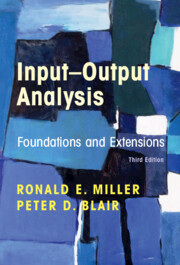Book contents
- Input–Output Analysis
- Input–Output Analysis
- Copyright page
- Contents
- Figures
- Tables
- Preface
- 1 Introduction and Overview
- 2 Foundations of Input–Output Analysis
- 3 Input–Output Models at the Regional Level
- 4 Organization of Basic Data for Input–Output Models
- 5 The Commodity-by-Industry Approach in Input–Output Models
- 6 Multipliers in the Input–Output Model
- 7 Supply-Side Models, Linkages, and Important Coefficients
- 8 Decomposition Approaches
- 9 Nonsurvey and Partial-Survey Methods:
- 10 Nonsurvey and Partial-Survey Methods:
- 11 Social Accounting Matrices
- 12 Energy Input–Output Analysis
- 13 Environmental Input–Output Analysis
- 14 Mixed and Dynamic Models
- 15 Additional Topics
- Postscript
- Book part
- Author Index
- Subject Index
- References
1 - Introduction and Overview
Published online by Cambridge University Press: 06 January 2022
- Input–Output Analysis
- Input–Output Analysis
- Copyright page
- Contents
- Figures
- Tables
- Preface
- 1 Introduction and Overview
- 2 Foundations of Input–Output Analysis
- 3 Input–Output Models at the Regional Level
- 4 Organization of Basic Data for Input–Output Models
- 5 The Commodity-by-Industry Approach in Input–Output Models
- 6 Multipliers in the Input–Output Model
- 7 Supply-Side Models, Linkages, and Important Coefficients
- 8 Decomposition Approaches
- 9 Nonsurvey and Partial-Survey Methods:
- 10 Nonsurvey and Partial-Survey Methods:
- 11 Social Accounting Matrices
- 12 Energy Input–Output Analysis
- 13 Environmental Input–Output Analysis
- 14 Mixed and Dynamic Models
- 15 Additional Topics
- Postscript
- Book part
- Author Index
- Subject Index
- References
Summary
The introductory chapter recaps the genesis of the field of input–output or interindustry analysis as a widely utilized framework to analyze the interdependence of industries in an economy. The introduction chronicles how the input–output framework, conceived originally by Wassily Leontief in the 1930s, has matured over the last seven decades to become a key component of many types of economic analysis and one of the most widely applied methods in economics. This book presents the framework set forth by Leontief and explores the many extensions that have been developed, and the introduction concludes by summarizing the key features of the succeeding chapters, appendices, and related online resources chronicling those developments.
- Type
- Chapter
- Information
- Input-Output AnalysisFoundations and Extensions, pp. 1 - 9Publisher: Cambridge University PressPrint publication year: 2022



